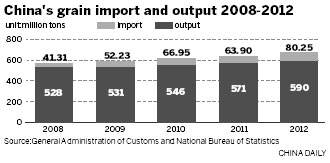Grain imports grow as eating habits change

|
 Workers are loading imported soybean at Nantong port, Jiangsu province. Despite plentiful harvests, China is still challenged by over-demand for grains, with imports set to continue to grow in the second half of the year. [Photo / China Daily]
|

Animal feed, ethyl alcohol and starch are partly behind demand
China's grain imports will rise in the second half of this year, as the population continues to gain access to higher-protein food and industrial use of grain crops expands, industry experts said.
Ding Shengjun, senior researcher at the Academy of the State Administration of Grain, said China's industrial and customer demand for crops such as corn, wheat and rice has grown quickly since 2012.
Even though China's summer grain harvest rose 1.5 percent this year to 131.89 million tons, the nation still faces the challenge of balancing supply and demand.
First-half grain imports from such nations as the United States, Canada and Australia stood at 5.48 million tons, with a total value of $2.03 billion, according to the General Administration of Customs.
"Industrial consumption now far exceeds food demand" for grain, Ding said. "More than 72 percent of corn is consumed in the intensive-processing industries of animal feed, ethyl alcohol and starch."
The China National Grain and Oils Information Center reported that more than 120 million tons of corn and 7.5 million tons of wheat were used by the livestock industry in 2012. Biochemical producers used 61 million tons of corn last year, up 9 percent from 2011.
Not all of the processed grain is sold domestically. China produced 190 million tons of animal feed for export last year, up 5.5 percent year-on-year. The feed was sold to a number of countries, including Mongolia, Ukraine, Australia and New Zealand, according to the Center of China Agriculture for Trade and Economy of the Ministry of Agriculture.
Domestic grain output reached 590 million tons in 2012, while imports of wheat, rice and corn set a record of 71 million tons. Including such minor products as sesame, total grain imports hit 80.25 million tons.
The nation's growing demand for imported grain is causing some concern.
The weak global economy has meant that world food prices "have dropped to a lower price range since 2012, especially for grains", said Wang Kai, a professor at Nanjing Agricultural University in Jiangsu province.



















